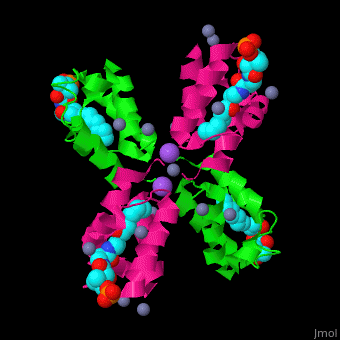Function
Acyl carrier protein (ACP) is a component of the fatty acid biosynthesis cycle. ACP catalyzes the addition of a thioester to a phosphopantetheine moiety. The phosphopantetheine moiety is added post-translationally to ACP serine residue by ACP synthetase (ACPS). The phosphopantetheine contains a free SH group which binds acyl groups in the fatty acid biosynthesis as thioesters. The acyl groups from acetyl-CoA and malonyl-CoA are transferred to ACP. There are 2 types of ACP. ACP I is a multifunctional polypeptide found in yeast and mammals while ACP II is a monomeric protein found in bacteria and plants.[1]
See also:
Structural highlights
(2fad). of E. coli acyl carrier protein. Water molecules are shown as red spheres.
The (colored in darkmagenta) in an expandable hydrophobic cavity.[2]
3D structures of acyl carrier protein
Acyl carrier protein 3D structures

